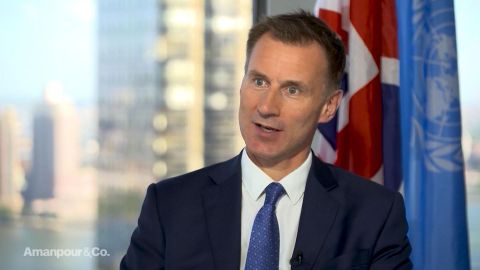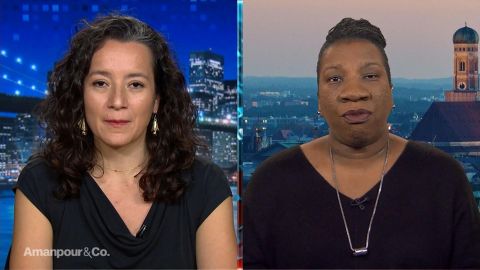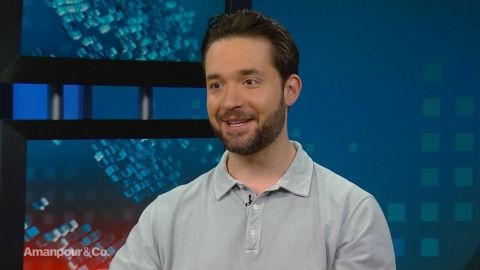Read Transcript EXPAND
HARI SREENIVASAN: All right. First, let’s talk about the big money part of it. Initialized Capital. You look at your website. You’ve got 125 plus companies. So how do you figure, out of your 120 plus bets, how many of them need to become super successful?
ALEXIS OHANIAN: Yes. I mean there are, you know, for every one Coinbase or Instacart, there are 20, 30, 40 that won’t survive. And that’s the math that at this kind of early stage of investing actually still works. It really is a power law where the returns from these one or two big bets that are successful makeup for all the others that aren’t. The upside of that is it lets us be a little bit more aggressive and be able to take sort of bigger bets or bolder bets on ideas that are a little further out there.
SREENIVASAN: You’ve also made a bet in the driverless car space.
OHANIAN: Yes.
SREENIVASAN: That’s been on Cruise. That would be a partner that was acquired by G.M.
OHANIAN: That’s right. So we grew the first investors in Cruise. It was just — at that point, it was basically a research project because no startup back in 2012 really thought that they could compete with the likes of Google or Uber, these others. And then we went back a second time actually, invested in another self-driving car company called Voyage. Their approach is a little different. What they found was an opportunity where they’re able to get their cars on the roads today by using retirement communities. These are large swaths of land that have many many miles of roads that look and train the computers just like any other road. It’s contained, it’s private land, and so they can work with these retirement communities and offer an amazing service to people who are otherwise pretty limited in mobility, right.
The idea that your grandparents can have a self-driving taxi service to help take them to the store, gives them mobility and freedom they didn’t have before. And in fact, the cars only go like 25 miles an hour is actually a feature. That’s actually probably how fast most of those cars would be going if the elderly were behind the wheel anyway.
SREENIVASAN: Right.
OHANIAN: And it’s finding a way to use this technology that is practical and valuable and safe but also collecting data now in real time regularly on real roads. And I think long term, that’s where the value is going to be. These cars will get smarter the more hours they spend on the roads because these cameras, this AI is constantly learning and absorbing and improving.
SREENIVASAN: Let’s talk a little bit about the content struggles a lot of these platforms are having to deal with right now. I mean the kind of the enforce (ph) conundrum. The president recently weighed in and he is warning people about the power of the platforms, their political influence, they don’t like me in the first place. But is their concern that they are so powerful now that they are players in the political process?
OHANIAN: So interesting because now it’s coming — so it’s coming from the left and the right. I think these platforms are trying very very hard to maintain a neutrality and —
SREENIVASAN: Is that possible?
OHANIAN: — the reality is — ultimately I don’t think that’s possible. I think with Google, Facebook and these others haven’t done so well though is entrenched themselves in our lives in such a fundamental way for so long that I do believe — I mean part of what we do is look for an early stage investor who wants to do something as audacious as topple Google or topple Facebook one day or build a competitor to them. But admittedly, the impact that they’ve been able to have and build up is wide-reaching and it affects many many parts of our life.
SREENIVASAN: Reddit in a way has become, as you guys call it, the front page of the Internet, right. But beyond the front page, behind it, there are also places where you find incredibly distasteful speech. I mean you can find it on forums that support the president right now, really racist memes that would attack you for being Armenian or your wife for being African-American, right. I mean so what is — how do you solve for that?
OHANIAN: Well, it is reprehensible. And I do remember, this was many years ago, the first time I had an Armenian genocide denial posed at me. On the one hand, I thought, “OK. Well, you know, this is despicable and obviously, I hate it.” And at the same time, I thought, “OK. Well, I guess like we’re at a scale now where this is a real — this is the reality. We’re now a global enough platform that we’re seeing these worldviews that are so awful and so offensive.” The solution for how do we fix it is a bigger — this is a bigger global one I think. I do think that through more exposure and through more communication, we do get to more empathy and understanding. Through more conversation, we get there and I’ve seen it in glimpses on Reddit. I’ve seen and I do believe that long-term, sunlight and truth wins.
SREENIVASAN: But that’s a really long term. I mean very long. Theologically, irrational people who hold despicable points of view are not often convinced by facts. They’re not convinced by —
OHANIAN: We have a flat earth theory going around right now that’s picking up steam. Like a flat earth theory in 2018. You know I remember reading about The Enlightenment. And I think when I was — I think when I was studying it in history, I just sort of assumed that like there was this enlightenment. And then after that, like everyone was like cool, rational thought, scientific method. Like, great world’s fixed, it started, it’s done. And I pretty — I guess I really naively sort of thought that. And this is surfacing now, this reality that like no actually there are a lot of people for whom this — like just sort of miss or who even today just don’t care, and would rather see things that reinforce their world. Like explicitly, would rather see things that reinforce their worldview than challenge it with data.
SREENIVASAN: Is there a rule for regulation then?
OHANIAN: I can imagine that coming from this president given his history of being very anti-regulation. I think there is still — I mean I think there is still real competition. I do — I mean actually we have — one of our big thesis is around the like anti-Amazon thesis where because of Amazon’s place in the market, when they decide to go into something, it creates an amazing opportunity for startups to basically arm their opponents. And so we saw this most recently with comical standard cognition which does self-checkout. When Amazon launched, it was Amazon Go to Self-Checkout Store, just pick up the peanuts and walk out. Every retailer realized, “Oh no. I’m going to bring more. I don’t have this work. What do I do?” Exactly.
And because they know they can’t build it themselves, they come to a startup like Standard Cognition and then started with customers. So I do see that actually serving as a tremendous boon for competition. But the reality is the incumbents themselves have neglected technology so much, they can’t build it themselves. They can’t go to their CTO and say, “OK. We need a solution in eight months.” Just the engineering talent isn’t there. There’s just — they’re unable to build it. They have to partner with these startups.
SREENIVASAN: Let’s talk a little bit about your much longer-term investments.
OHANIAN: My family.
SREENIVASAN: Yes. So you’re married to Serena Williams. Is she as competitive off the court as she is on the court?
OHANIAN: Yes.
SREENIVASAN: Have you ever beat her on anything?
OHANIAN: Oh, yes. It’s just — I mean there’s a few video games. Actually, there’s a few that she’ll still — she’ll wash me in the classics, the classic NES games she’s better at but it’s less about competition with someone else. It’s more about her own — almost like a competition with herself. She is one of the sort of hardest people on themselves who I know and that’s what makes her great.
SREENIVASAN: And a humbling experience? I mean you said at one point that you thought you worked hard.
OHANIAN: Oh, yes. I thought I worked so hard. Tech is full of these myths around, you know, nonstop working in the grind, in the hassle and all this stuff and I really believed I was like, “OK. Well, I’m in the hardest working industry. They’re working all the time. Your doors never close.
It’s 24/7 Internet blah blah blah.” And yes, I was so wrong, very very wrong.
I think what I didn’t really appreciate, what I didn’t really understand until I saw it first hand was what a pressure it is and what an intensity it is to do your job in front of so many people, but there is so much on you when you are out there. I used to hate tennis. I thought tennis was a boring sport. I would change the channel. It was — I was so wrong. And to see what she’s been able to do at the level she’s done it in a sport where it’s just you, it’s just you out there, is just amazing. It’s absolutely amazing.
SREENIVASAN: One of the things that she did which was surprising and startling to a lot of people was she was very open about going through postpartum depression. It’s just not something that a lot of women share, much less women of her fame and fortune so to speak. But it’s also not something that men talk about.
OHANIAN: I mean, look, as a husband, I just want to be there. I want to be the rock. I want to be supportive. And it is already so much to carry a child, to have a child, to do all of that. Not to mention all the complications that she had to go through and endure. Yes. I mean I was so — I was very proud of her for speaking about it publicly. She realizes the platform she has in the world. And I think what’s so special is she’s always been very unfiltered. And when you combine her level of success with this unfiltered nature, I think there’s a hunger for this realness because there’s a lot that isn’t that —
SREENIVASAN: That so much is just polished and part of the presentations of the vacation that you had and whatever but —
OHANIAN: Our Instagram culture. And look, I’m guilty of it too. Like it is the rose-tinted sort of best version of yourself that you want to present to the world. And I think that’s fine and that’s something we as humans want but that creates a hunger for that real talk. And, you know, I’ve had so many people just randomly come up to me, and mothers in particular, just walking down the street now who will thank me for — and I’m like why are you thanking me, it’s just sent along to your wife because of what she said and what she’s talked about and how much it means to them. And I’m happy, very happy, to deliver that thanks.
SREENIVASAN: You got a one-year-old, what is she teaching you?
OHANIAN: That everything I’ve done up until this point, not that cool, not that great. As proud as I was of all the things I’ve done in my career, I just — I look at that little baby and I’m just like this is my legacy.
SREENIVASAN: Recently, an associate on Instagram criticized you for taking what he called family vacation and response resonated with a lot of parents.
OHANIAN: Yes.
SREENIVASAN: Was the vacation wild?
OHANIAN: That was wild. It’s like a week with my fam and yes. An associate in another V.C. firm had made some note about being — implying that I wasn’t working hard. And I was on vacation but I think this kind of goes back to that the same notion that tech has in our little bubble that we are this — we have to be this hardest working 24/7, got to grind mentality which is just — it’s not true but it’s also dangerous. I worry because there is so much, especially in masculinity tied up in the grind and the hassle and work, and especially when it comes to family where there had been a huge proponent for paid family leave because I want men to be taking time off. I want women to be able to take time off. I mean right now we have, I think one in four American women, are back at work two weeks later after having a kid. I think that’s insane. To be the last developed country to not have any kind of policy is insane. And I’ve spoken about it. I took four months leave.
SREENIVASAN: And you’re fortunate to be able to do that.
OHANIAN: And I was very lucky to do that. And that is something I will give the tech industry credit for. It is a pretty standard thing to have generous parental leave policies intact and I hope it can be a standard for other industries but I want it to be a standard for the country. And if there is that policy in place, taking advantage of it is another level because so many men still don’t. And this provides a sort of double advantage because one, it means men get to spend time with their families during these early days which are really important. But it also gives more air cover to women in the organization to take time off and help to start to change a lot of those cultural and systemic problems that exist in tech and in business around women in the workforce. And so I was proud to take all my time off. And I’m happy to be speaking out about it because it is very hard to try and balance it all. And actually, for the first time, it was like a month ago at the Commonwealth Club, actually got asked the question my wife’s been asked plenty of times which was how do you balance at all work and family. And I was happy to be asked it because I hadn’t gotten asked it and I know she gets asked it in so many working women, moms who get asked it all the time. And I would like us all to get asked that enough that we just never – it never even becomes an issue anymore, it just becomes a question.
SREENIVASAN: All right. Alexis Ohanian, thanks for joining us.
OHANIAN: Thank you.
About This Episode EXPAND
Christiane Amanpour interviews Tarana Burke, founder of MeToo & Ana Maria Archila who confronted U.S. Senate Republican Jeff Flake; and Jeremy Hunt, British Foreign Secretary. Hari Sreenivasan interviews Alexis Ohanian, Co-founder of Initialized Capital.
LEARN MORE


